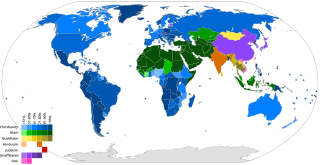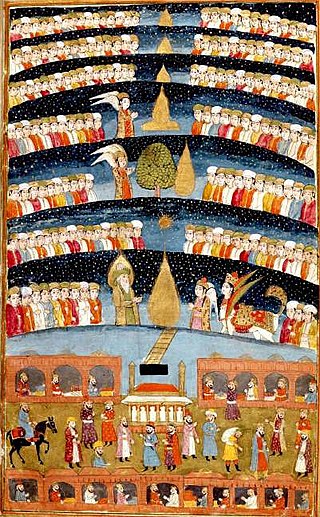Islamic eschatology is a field of study in Islam concerning future events that would happen in the end times. It is primarily based on sources from the Quran and Sunnah. Aspects from this field of study include the signs of the final age, the destruction of the universe and Judgement Day.

The Society of the Muslim Brothers, better known as the Muslim Brotherhood, is a transnational Sunni Islamist organization founded in Egypt by Islamic scholar and schoolteacher Hassan al-Banna in 1928. Al-Banna's teachings spread far beyond Egypt, influencing today various Islamist movements from charitable organizations to political parties.

The Deobandi movement or Deobandism is a revivalist movement within Sunni Islam that adheres to the Hanafi school of law. It formed in the late 19th century around the Darul Uloom Madrassa in Deoband, India, from which the name derives, by Muhammad Qasim Nanautavi, Rashid Ahmad Gangohi, and several others, after the Indian Rebellion of 1857–58. They consider themselves the continuation of Ahlus Sunnah wal Jamaat. The main purpose of this movement was to reject the traditional Sunni practices such as visiting shrines, celebrating urs and other orthodox Sunni Sufi practices, which they consider as shirk and bid'ah. They opposed influence of non-Muslim cultures on the Muslim of South Asia. The movement pioneered education in religious sciences through the Dars-i-Nizami associated with the Lucknow-based ulama of Firangi Mahal with the goal of preserving traditional Islamic teachings from the influx of modernist, secular ideas during British colonial rule. The Deobandi movement's Indian clerical wing, Jamiat Ulema-e-Hind, was founded in 1919 and played a major role in the Indian independence movement through its participation in the Pan-Islamist Khilafat movement and propagation of the doctrine of composite nationalism.

A religious denomination is a subgroup within a religion that operates under a common name and tradition, among other activities. The term refers to the various Christian denominations. It is also used to describe the five major branches of Judaism. Within Islam, it can refer to the branches or sects, as well as their various subdivisions, such as sub-sects, schools of jurisprudence, schools of theology and religious movements.
Islamophobia is the irrational and unjustified fear of, hatred of, or prejudice against the religion of Islam or Muslims in general, especially when seen as a geopolitical force or a source of terrorism.

The Salafi movement or Salafism is a revival movement within Sunni Islam, which was formed as a socio-religious resistance to European imperialism during the late 19th century and has remained influential in the Islamic World for over a century. The name "Salafiyya" refers to advocacy of a return to the traditions of the "pious predecessors", the first three generations of Muslims, who are believed to exemplify the pure form of Islam. In practice, Salafis maintain that Muslims ought to rely on the Qur'an, the Sunnah and the Ijma (consensus) of the salaf, giving these writings precedence over later religious interpretations. The Salafi movement aimed to achieve a renewal of Muslim life and had a major influence on many Muslim thinkers and movements across the Islamic world.

In Islam, Jannah is the final abode of the righteous. According to one count, the word appears 147 times in the Qur'an. Belief in the afterlife is one of the six articles of faith in Sunni and Twelver Shi'ism and is a place in which "believers" (Mumin) will enjoy pleasure, while the unbelievers (Kafir) will suffer in Jahannam. Both Jannah and Jahannam are believed to have several levels. In the case of Jannah, the higher levels are more desirable, and in the case of Jahannam, the lower levels have a higher level of punishments. — in Jannah the higher the prestige and pleasure, in Jahannam the severity of the suffering. The afterlife experiences are described as physical, psychic and spiritual.

The All-India Muslim League (AIML) was a political party established in Dhaka in 1906 when some well-known Muslim politicians met the Viceroy of British India, Lord Minto, with the goal of securing Muslim interests on the Indian subcontinent.

Radio Centraal is a Belgian "underground" radio station in the old city center of Antwerp. It began broadcasting on 31 October 1980 on 103.9 FM as one of the first pirate radio stations which started around the country in protest against the broadcasting monopoly of the national state networks. It always was and still remains an independent radio project with many experimental programmes and niche music. The station is structured as a not-for-profit organisation. The contributors are all volunteers and all the on-air talent finance the investment and cover the running costs of the project. In this way, Radio Centraal can stay independent from local government or commercial sponsors. Most programming is in Dutch, but there are many programmes in English and other languages. The station offers a starting platform for aspiring, ambitious and creative radio broadcasters, who are given licence to experiment in sound, editorial, music, reportage and language. Several have gone on to have careers in Belgian national media. Original founder members such as Jan Balliauw and Stefan Blommaert now work at VRT television as international correspondents.

Ziauddin Sardar is a British-Pakistani scholar, award-winning writer, cultural critic and public intellectual who specialises in Muslim thought, the future of Islam, futurology and science and cultural relations. He wrote or edited more than 50 books Prospect magazine named him as one of Britain's top 100 public intellectuals and The Independent newspaper called him: 'Britain's own Muslim polymath'.

Islam is the second-largest religion in the United Kingdom, with results from the 2011 Census giving the population as 4.4% of the total UK population, while results from the 2021 Census recorded a population of 6.5% in England and Wales. London has the greatest population of Muslims in the country. The vast majority of Muslims in the United Kingdom adhere to Sunni Islam, while smaller numbers are associated with Shia Islam.

Timothy John Winter, also known as Abdal Hakim Murad, is an English academic, theologian and Islamic scholar who is a proponent of Islamic neo-traditionalism. His work includes publications on Islamic theology, modernity, and Anglo-Muslim relations, and he has translated several Islamic texts.
Criticism of Islam is questioning or challenging the beliefs, practices, and doctrines of Islam. Criticism of Islam can take many forms, including academic critiques, political criticism, religious criticism, and personal opinions.
Jihad Watch is an American far-right Islamophobic conspiracy blog operated by Robert Spencer. A project of the David Horowitz Freedom Center, Jihad Watch is the most popular blog within the counter-jihad movement.
Fareena Alam is a British journalist and program designer. She was formerly the editor of Q News.

Islam is an Abrahamic monotheistic religion centered on the Quran and the teachings of Muhammad, the religion's founder. Adherents of Islam are called Muslims, who are estimated to number approximately 1.9 billion worldwide and are the world's second-largest religious population after Christians.
Democratic media is a form of media organization that strives to have the principles of democracy underlying not only the production of content, but also the organization of the entire project. Civic media is another term with similar concept and therefore can be used interchangeably in many contexts. The mission of the defunct Center for Civic Media of MIT is to design, create, deploy, and assess tools and processes that support and foster civic participation and the flow of information between and within communities, working at the intersection of participatory media and civic engagement.
Islamophobia in the media refers to negative coverage of Islam-related topics, Muslims, or Arabs by media outlets in a way that is hostile, untrue, and/or misleading. Islamophobia is defined as "Intense dislike or fear of Islam, especially as a political force; hostility or prejudice towards Muslims", and the study of how and to what extent the media furthers Islamophobia has been the subject of much academic and political discussion.

Hizb ut-Tahrir Britain is the official name of the United Kingdom branch of Hizb ut-Tahrir, a transnational, pan-Islamist and fundamentalist group that seeks to re-establish "the Islamic Khilafah (Caliphate)" as an Islamic "superstate" where Muslim-majority countries are unified and ruled under Islamic Shariah law, and which eventually expands globally to include non-Muslim states such as Britain. The group was designated a proscribed terrorist organization in the UK in January 2024.












